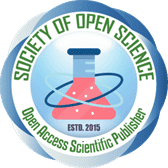Evaluation of Antimicrobial activity of Moringa oleifera Leaf extracts against Pathogenic bacteria Isolated from Urinary tract infected Patients
Keywords:
Moringa leaf extracts, Antimicrobial activity, Pathogenic bacteriaAbstract
Antibiotic resistance has increased substantially in recent years and is posing an ever-increasing therapeutic problem. One of the methods to reduce the resistance to antibiotics is by using antibiotic resistance inhibitors from plants. The aim of this study is to evaluate the antibacterial properties of aqueous, petroleum ether and methanolic leaf extracts of Moringa oleifera plant against pathogenic bacteria isolated from urinary tract infected patients and five standard strains of American type culture collection. The antibacterial activity of Moringa oleifera leaf extracts was determined in vitro, using Cup plate method, and compared with sensitivity testing of some antibiotic agents using disc diffusion method. The results obtained showed that all concentration of methanolic extracts of Moringa oleifera had high inhibitory effects on S. aureus ATCC25923, K. pneumoniae ATCC35637 standard strains and the S. aureus, S. saprophyticus and E.coli isolated from UTI. The three concentration of water extract had inhibitory effects only on Proteus vulgaris NCTC8196 strain. The petroleum ether extracts showed no inhibitory activity on any organism. These results were compared with standard antibiotics Amikacin, Ciprofloxacin, and Norfloxacin which showed moderate sensitivity against S. aureus and Amikacin was completely resistant to K. pneumoniae isolated from UTI. These results provide valuable information that Moringa oleifera hold great promise as highly effective antibacterial agents.
Downloads
References
Barrow, G.I. & Feltham, R.K.A. (2003). Cowan and Steel's Manual for the Identification of Medical Bacteria. 3rd ed., Cambridge University Press, Cambridge, pp. 45-120.
Bugno, A., Nicoletti, M.A., Almodóvar, A.A.B., Pereira, T.C. & Auricchio, M.T. (2007). Antimicrobial efficacy of Curcuma zedoaria extract as assessed by linear regression compared with commercial mouthrinses. Braz. J. Microbiol., 38: 440–445. https://doi.org/10.1590/S1517-83822007000300011.
Bukar, A., Uba, A. & Oyeyi, T. (2010). Antimicrobial profile of Moringa oleifera Lam. extracts against some food – borne microorganisms. Bayero Journal of Pure and Applied Sciences, 3(1): 43-48. http://dx.doi.org/10.4314/bajopas.v3i1.58706.
Devendra, B.N., Srinivas, N., Prasad, V.S.S.L. & Latha, P.S. (2011). Antimicrobial Activity of Moringa oleifera Lam., leaf extract, against selected Bacterial and Fungal Strains. Int. J. Pharm. Bio. Sci., 2(3): 13-18.
Donli, P.O. & Dauda, H. (2003). Evaluation of aqueous Moringa seed extract as a seed treatment biofungicide for groundnuts. Pest Manag. Sci., 59(9): 1060–1062. https://doi.org/10.1002/ps.595.
Eilert, U., Wolters, B. & Nahrstedt, A. (1981). The antibiotic principle of seeds of Moringa oleifera and Moringa stenopetala. Planta Med., 42(1): 55–61. https://doi.org/10.1055/s-2007-971546.
El Astal, Z.Y., Ashour, A.E.R.A. & Kerrit, A.A.M. (2005). Antimicrobial activity of some medicinal plant extracts in Palestine. Pak. J. Med. Sci, 21(2): 187-193.
Eleyinmi, A.F. (2007). Chemical composition and antibacterial activity of Gongronema latifolium. J. Zhejiang Univ. Sci. B., 8(5): 352–358. https://doi.org/10.1631/jzus.2007.B0352.
Faizi, S., Siddiqui, B.S., Saleem, R., Siddiqui, S., Aftab, K. & Gilani, A.H. (1994). Isolation and structure elucidation of new nitrile and mustard oil glycosides from Moringa oleifera and their effect on blood pressure. J. Nat. Prod., 57(9): 1256–1261. https://doi.org/10.1021/np50111a011.
Jahn, S.A.A., Musnad, H.A. & Burgstaller, H. (1986). The tree that purifies water: cultivating multipurpose Moringaceae in the Sudan. Unasylva, 38: 23–28.
Jabeen, R., Shahid, M., Jamil, A. & Ashraf, M. (2008). Microscopic evaluation of the antimicrobial activity of seed extracts of Moringa oleifera. Pak. J. Bot., 40(4): 1349-1358.
Manguro, L.O. & Lemmen, P. (2007). Phenolics of Moringa oleifera leaves. Nat. Prod. Res., 21(1): 56–68. https://doi.org/10.1080/14786410601035811.
Patel, P., Patel, N., Patel, D., Desai, S. & Meshram, D. (2014). Phytochemical analysis and antifungal activity of Moringa oleifera. Int. J. Pharm. Pharm. Sci., 6(5): 144-147.
Rojas, J.J., Ochoa, V.J., Ocampo, S.A. & Muñoz, J.F. (2006). Screening for antimicrobial activity of ten medicinal plants used in Colombian folkloric medicine: a possible alternative in the treatment of non-nosocomial infections. BMC Complement. Altern. Med., 6: 2. https://doi.org/10.1186/1472-6882-6-2.
Sen, A. & Batra, A. (2012). Evaluation of antimicrobial activity of different solvent extracts of medicinal plant: Melia Azedarach L. Int. J. Curr. Pharm. Res., 4(2): 67-73.
Talreja, T. (2010). Screening of crude extract of flavonoids of Moringa Oleifera against bacterial and fungal pathogen. J. Phytol., 2(11): 31-35.
Tsaknis, J., Lalas, S., Gergis, V., Dourtoglou, V. & Spiliotis, V. (1999). Characterization of Moringa oleifera variety Mbololo seed oil of Kenya. J. Agric. Food Chem., 47(11): 4495–4499. https://doi.org/10.1021/jf9904214.
Thilza, I.B., Sanni, S., Isah, Z.A., Sanni, F.S., Talle, M. & Joseph, M.B. (2010). In vitro Antimicrobial activity of water extract of Moringa oleifera leaf stalk on bacteria normally implicated in eye diseases. Academia Arena, 2(6): 80-82.
Valarmathy, K., Babu, P.A.S. & Abhilash, M. (2010). Antimicrobial activity of ethanolic extracts of various plant leaves against selected microbial species. Elec. J. Env. Agricult. Food Chem., 9(8): 1378-1382.
Viera, G.H., Mourão, J.A., Angelo, A.M., Costa, R.A. & Vieira, R.H. (2010). Antibacterial effect (in vitro) of Moringa oleifera and Annona muricata against Gram positive and Gram negative bacteria. Rev. Inst. Med. Trop. Sao Paulo, 52(3): 129–132. https://doi.org/10.1590/s0036-46652010000300003.
Walter, A., Samuel, W., Peter, A. & Joseph, O. (2011). Antibacterial activity of Moringa oleifera and Moringa stenopetala methanol and n-hexane seed extracts on bacteria implicated in water borne diseases. Afr. J. Microbiol. Res., 5(2): 153–157. https://doi.org/10.5897/AJMR10.457.
Downloads
Published
How to Cite
Issue
Section
License
Copyright (c) 2016 The author(s) retains the copyright of this article.

This work is licensed under a Creative Commons Attribution 4.0 International License.
This is an open access article distributed under the Creative Commons Attribution License which permits unrestricted use, distribution, and reproduction in any medium, provided the original work is properly cited.





